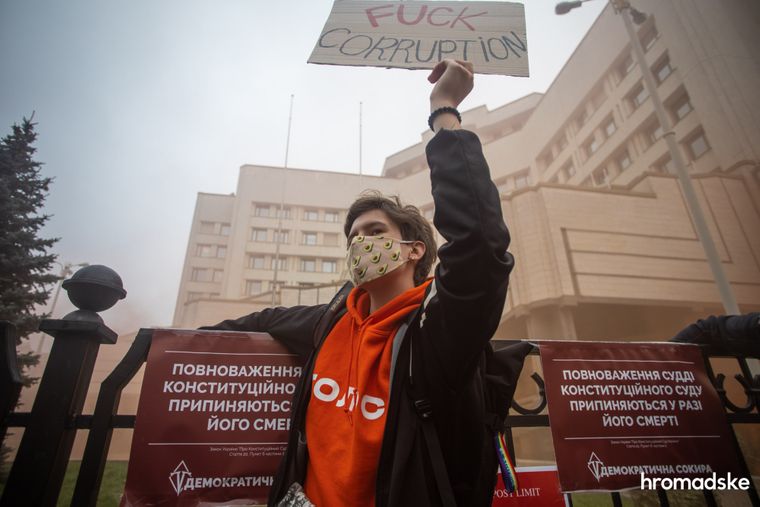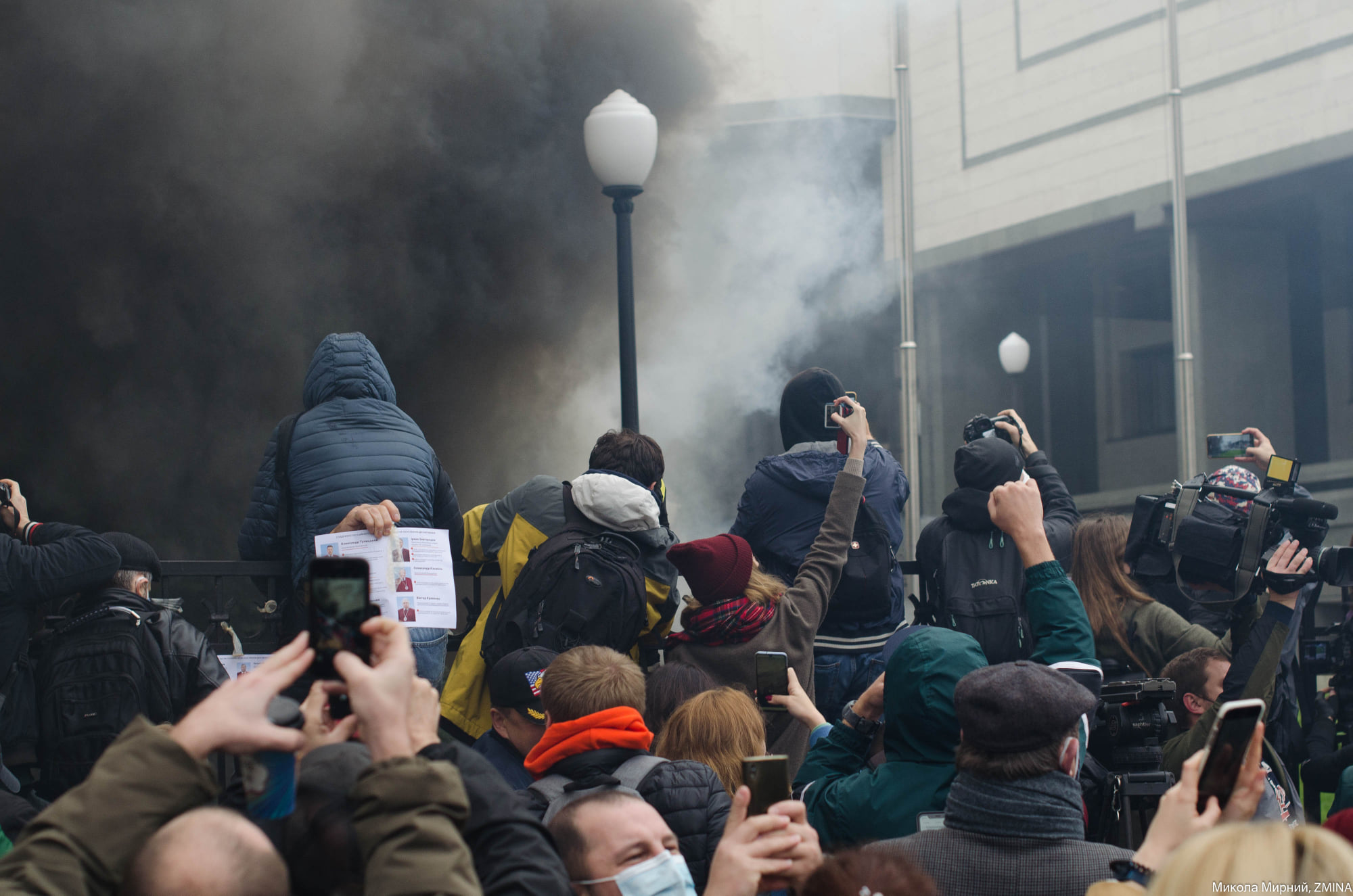Experts gathered by the German Zentrum Liberale Moderne shared their thoughts about the situation in a discussion, which we summarize below.
READ ABOUT THE CONSTITUTIONAL COURT DECISION HERE:
[/boxright]Constitutional Court torpedoes Ukraine’s anti-corruption reform
Ukraine finds itself between a rock and a hard place after a decision of its Constitutional Court killed the country’s asset declaration system and gutted the National Agency on Corruption Prevention (NAZK), a pillar of its anti-corruption infrastructure.
Moreover, other progressive reforms hang by a thread: the Court is likely to produce a ruling revoking Ukraine’s newly-opened land market, and decisions on such critical issues as the High Anti-Corruption Court, the language law, and banking reform.
All of these issues are central to Ukraine’s cooperation with the IMF and EU, but especially so is the land market reform, the “second pillar of Ukraine’s cooperation with the IMF,” according to Daria Kaleniuk, CEO of the Ukrainian Anti-Corruption Action Center who spoke at a discussion on the Constitutional Court organized by the German think tank Zentrum Liberale Moderne (LibMod).
“They are acting as legal terrorists by keeping hostages inside and killing them one by one. They killed the anti-corruption reform, the next one is land reform, and next will be banking reform,” Ms. Kaleniuk added.
On 30 October, a protest was held at the building of the Constitutional Court. Photos: Oleksandr Khomenko / Hromadske
These judges have a shady reputation, she explained. Some of them were appointed by Yanukovych and are now colluding with oligarch Ihor Kolomoiskyi and Putin’s main Ukrainian ally Viktor Medvedchuk, who has within the last two years increased his media presence dramatically.
Moreover, in this ruling the Constitutional Court violated the Constitution: the decision it adopted was actually much more extended than the MPs who authored the submission asked for. The decision actually didn’t contain arguments and didn’t explain why certain articles of the Law on Preventing Corruption are unconstitutional. Additionally, the judges acted in a conflict of interest – forbidden by the Ukrainian Constitution – some of them were in the crosshairs of the NAZK.
“It is an existential threat to Ukraine. The Constitutional Court of Ukraine is occupied by judges who are not acting in the interests of the Ukrainian people. Therefore, they have to be stopped immediately,” Ms. Kaleniuk said.
The Court is posing a danger to all democratic reforms Ukraine adopted after 2014, Iryna Shyba, CEO of the DEJURE foundation said at the LibMod discussion.
[boxright]MORE ON WHY THIS COURT IS SO PROBLEMATIC
[/boxright]
How was it possible for the Court to adopt such an unsubstantiated decision? The procedure of appointing judges was politicized, Shyba told: to become a judge of this Court, one needs to have good ties in the President’s Office or Parliament. Out of the 15 judges in the Court (with 3 open seats), only four voted against the decision — they came from academia. This is why the decisions the Court makes are so often problematic.
“Over the years, we have seen decisions favoring President Kuchma, President Yanukovych. And this one is favoring President Putin… It cancels all the obligations we took upon ourselves to become part of the European community,” Ms. Shyba added.
Ukraine now finds itself in a constitutional crisis, as there is no possibility to appeal the decision. Additionally, according to the Constitution, the judges of the Court have life tenure and cannot be dismissed.
“But it’s not only about the decision — how do we restore the anti-corruption infrastructure that the Court destroyed, and protect the other laws? How do we ensure the integrity of the Constitutional Court itself? Unfortunately, in this case, there is no one decision. The least painful decision would be if the judges would resign. But now we realize that they will barge forward,” Ms. Shyba stressed.
No easy solution
Despite President Zelenskyy’s entourage being said to lobby this ruling, after hell broke loose, Zelenskyy declared war on Ukraine’s top court.
On the evening of 29 October, he promised to save the system of electronic asset declarations for public officials that the Court declared unconstitutional and convened a National Security and Defense Council meeting. Shortly thereafter, an extraordinary session of the Cabinet was held right in the President’s Office and, despite lacking the necessary authority, it ordered NAZK to ignore the country’s highest court by resuming access to the register of declarations. Apparently thanks to this, on 29 October, the e-declarations system reappeared online, having been down for most of the day.
Things moved fast: the State Bureau of Investigation launched into the possible treason of the Head of the Constitutional Court, judge Oleksandr Tupytskyi, who in 2018 purchased a parcel of land in occupied Crimea, thereby accepting the Russian authorities there as legitimate (moreover, he concealed the ownership of this property from the asset declaration register that was taken down by the decision of the Court that he chaired!). Then another probe was launched, regarding Tupytskyi’s possible participation in a “criminal organization.”
A political decision would mean violating the Constitution to quickly stop the rollback of reforms. It, however, might open Pandora’s box of legal consequences.
A legal decision is more uncertain and slower but does not ravage Ukraine’s legal system.
On 30 October, a protest was held at the building of the Constitutional Court. Photos: Zmina.info
A political way
President Zelenskyy was quick in making a political proposal by submitting a draft law to Parliament in which he proposed to terminate the powers of judges of the Constitutional Court (who have life-long tenure), to recognize its decision on asset declarations “null and void,” and to repeal the amendments to the Law “On Prevention of Corruption” that the decision caused. However, this law is not getting support in parliament.
“This is a dangerous precedent: it could open the way of relaunching other institutions which make unpopular decisions,” noted Iryna Shyba. According to her, a key problem with this proposal is that after the Constitutional judges are terminated, new judges should be appointed.
“But they will be appointed with the same procedure we had for the last 25 years – it will still be politicized, and it will still open the door to judges that will protect not the Constitution but the politicians who helped them gain this position,” Ms. Shyba said.
The Head of the Venice Commission and GRECO president criticized Zelenskyy’s draft law as a breach of the Constitution. The German ambassador to Ukraine and French foreign minister, on the contrary, appeared to praise it.
David Stulik, Head of Eastern European Program at European Values Centre for Security Policy in Prague, said that according to officials working in EU institutions, the EU’s position is similar to that of GRECO and Venice Commission: it is against solving the crisis in an unconstitutional way.
“We are really disturbed,” said Marieluise Beck, co-founder of LibMod.
She believes that the Court decision was a “counter-revolutionary step” and Ukraine would be wise to act as it did after Euromaidan, when then-President Yanukovych fled to Russia and Ukraine replaced him despite existing laws.
“Was replacing Yanukovych legal? How do 100,000 people on Maidan have the right to send away a legally elected president? Solutions were being taken there were not legal — it was a revolutionary situation. … If we share the analysis that the decision of the Constitutional Court was a well-organized, rational anti-revolutionary step to bring back a certain faction of oligarchs into power and push out the forces that push Ukraine on its westward course, then you have to ask yourself is the mere legal answer the correct one, or do we have the situation were the seemingly legal framework is being used to undermine a legal system to bring back old non-democratic forces?” Ms. Beck said.
She believes that in this situation, a political solution should not be ruled out, and proposes a crisis meeting of Zelenskyy with international institutions — the IMF and the EU — to find a solution on a solution to this dilemma.
Ms. Kaleniuk concurred: she believes the position of the head of the Venice Commission and GRECO letter, which told Ukraine it has to adhere to the rule of law and the Constitution. were “very strange.”
“We can’t fire the judges by changing the Constitution – they have to approve them. We can’t recall the judges. But the threats from upsetting reforms are higher than threats from violating the Constitution. And the threats of not acting are higher… Terrorists in the Constitutional Court are destroying Ukraine,” Ms. Kaleniuk added.

A legal way
Several legal proposals are being discussed in Parliament; they are more constitutional. They concern blocking the court’s ability to make further decisions, by increasing the quorum or increasing the number of judges that should vote in favor of a decision. Additionally, the CC is underseated: three open positions should be filled by Parliament and Congress of judges.
However, if they will be filled now, it will be done by the old procedure with no competition or integrity checks, Shyba reminds.
As well, Constitutional amendments could be submitted to change the composition of the Constitutional Court. This is the most legal path, but it’s unlikely that it will muster the 300 necessary votes in parliament — as well as the approval of sitting Constitutional Court judges.
“There is no solution to make it quickly. The Parliament’s political responsibility is to find a way to stop the Constitutional Court from canceling the reforms. But in parallel, they should be working on changes in procedures of how the judges should be selected,” she said.
Inspiration for changing the principles of operation of the Constitutional Court could be found in the process of creating the High Anti-Corruption Court, considered to be a success story. Candidates to this institution were selected with the participation of international experts who provided an integrity check for each candidate, which allowed ensuring its independence. This was made possible due to incessant lobbying of civil society acting in conjunction with Ukraine’s international partners.
David Stulik noted that the relaunch of the National Agency on Corruption Prevention, which also happened in a coalition of Ukraine’s western partners and civil society, could also be an example of finding a way forward with the Constitutional Court.
Reputational damage
Based on conversations with EU officials, David Stulik told the situation in Ukraine has created more challenges to defend Ukraine abroad and is a terrible reputational damage for Ukraine. The EU has many other issues on its plate right now. It has to deal with the conflict in Nagorny Karabakh, the situation in Belarus, elections in Georgia and Moldova.
“For the EU, it is another blow in the face; it contributes to the fatigue with Ukraine. My colleagues said this is the most unfortunate development; Ukraine was seen as a flagship country for the Eastern Partnership,” Mr. Stulik noted.
According to him, Ukrainian authorities are “playing a sort of a game with the donors” and the patience on the side of the westerners can come to an end. Although some Ukrainian officials, like Foreign Minister Dmytro Kuleba, proclaimed that Ukraine’s visa-free regime is not endangered, that is not the case, Mr. Stulik asserted.
Maybe it will not be dropped immediately, but it may soon be on the agenda, and the reputational damage has been done. But losing the visa-free regime is not the only possible consequence of the Constitutional Court decision: infrastructure for fighting against corruption are conditions for IMF and EU macro-financial assistance.
“Ukrainian officials perfectly know what needs to be done, but there are vested interests preventing them from needed actions in the judicial and anti-corruption reforms,” Mr. Stulik said.














